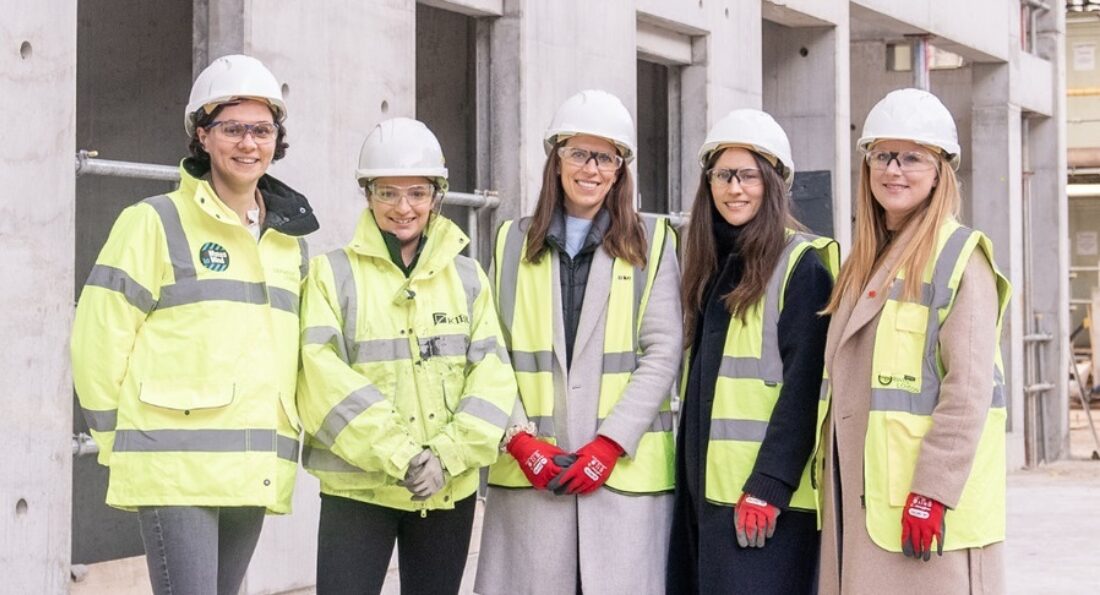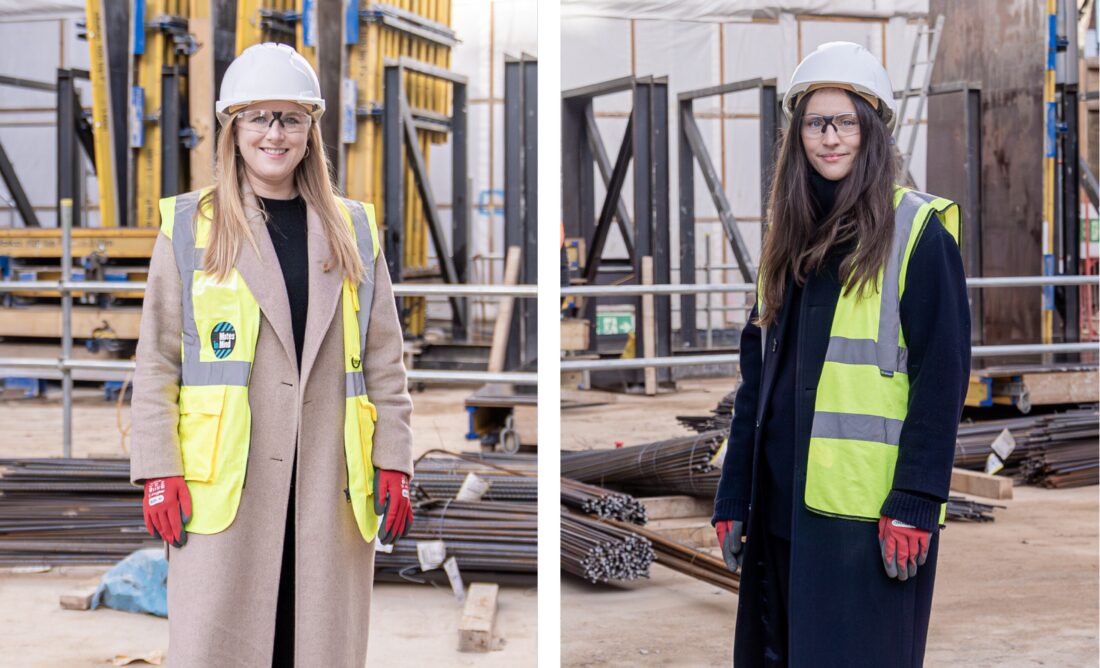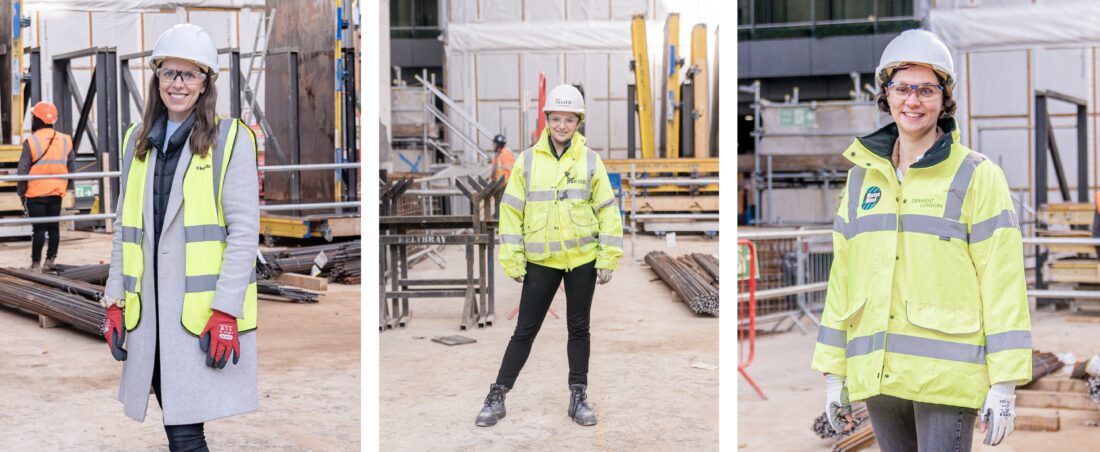In celebration of International Women's Day, we recognise the invaluable contributions of women in the construction industry. In this Q&A, we have the privilege of hearing from five women from various sectors working on site at Network W1.
Despite historical underrepresentation, their first-hand experiences and unique perspectives provide invaluable insight into the construction industry's current landscape and the promising future it holds for women.

What drove you to choose a career in your industry?
Rosie Scott: An interest in design and science at school age - architecture seemed like the best combination of the two. Even though that ended up not being the best route for me, from there I made a series of choices that moved me around to various different roles up to where I am now at Derwent.
Marine Zub: My love for craft and design was what first drove me to pursue a career in architecture. It's an artistic science and being able to combine creativity with concept development while learning technical skills and a savoir-faire was key to me. Working with space and interpreting the world on paper seemed a fun career choice.
Caroline Haines: Gaining work experience was so important in understanding how versatile the real estate industry is and the many opportunities available which I found so attractive. As an English undergraduate I explored several career paths, but I loved that property was a 'people' industry which makes it so fulfilling. I would say be open to new opportunities as they arise as you never know what paths they may open. As a Development Manager, it is incredibly rewarding to see a concept or idea be brought to life to create new workplaces for people to thrive.
Kate Dybeck: I chose design management in the construction industry through my fascination of seeing construction projects going from a concept on a piece of paper to appearing out of the ground, and then becoming part of the world that people work, play, live, and learn in. This, along with my passion for collaborating and problem solving.
Szilvia Allen-Kovacs: Health and Safety is very versatile as it involves all industries, from Property Management, to construction projects, and anything from engineering to dangerous substances, fire and human behaviour. It requires a lot of collaboration and coordination amongst people which keeps the day interesting. The ultimate goal is to make sure everybody who comes to work will go home safely to their families. As far as purpose goes, it doesn't get much better.

Left - Rosie Scott, Senior Project Manager at Derwent London; Right - Marine Zub, Architectural Designer at Piercy&Company
Have you encountered and broken any stereotypes in your career? How have you observed the industry evolving in terms of gender dynamics?
Rosie Scott: There has definitely been an increase in the number of women and a positive shift in the industry's approach to women in the last 10-15 years. This is my own experience and will not apply to all aspects of property and construction - there is still a way to go. There is still some perceived stereotype that the construction industry is all hard hats, muddy boots and locker-room culture - but it is so much more diverse that that. There are roles for so many different interests and skills, and I think a lot of women are missing out on a very positive and satisfying career because of that stereotype, which needs to be broken down from grass roots, school level.
Marine Zub: I have encountered stereotypes since I started my architecture education, and the recurring one is people assuming I'm an interior decorator despite mentioning I was a trained architect. There are preconceptions about what an architect might be, and women often have to push through the initial assumptions. It's partly due to Architecture being seen as a "man's job", the primary reason I think, is that women are often dissociated from the built environment, especially on building sites where they're still rarely present. Even though architecture is considered a gender bias industry, I can see that companies are making an effort on gender parity, however, the subject of equality still needs to stay central to see more diverse female representations in the workplace.
Caroline Haines: The gender imbalance within the development and construction industries is certainly changing but with further work needed to encourage more diversity at entry level. There have been many times when I have been the only woman in the room, but this does not mean that I am undervalued or my voice not heard. It's empowering to know that women in development have a valued seat at the table.
Kate Dybeck: In my role as a Design Lead, I have seen a positive shift in the way women are perceived in the construction industry. It is a fast paced and exciting industry which needs many different personalities, viewpoints and strengths to succeed. For this, a diverse workforce is required.
Szilvia Allen-Kovacs: I have worked with and around lots of engineers in the past where 'locker room chats' were common and 'not meant for women's ears', however with changing general perceptions this has now evolved in the majority of cases. I think many people in my early career were surprised that I did want to go in and see 'hard to reach', 'back of house' workshops and how people worked. I suspect the expectation was that I was going to only do desktop review from the comfort of our office. Taking genuine interest in people's work is always appreciated. There are more and more women coming through in the industry which means facilities are now also provided for women on construction sites and traditionally male-dominated environments, which used to be only done by exception.

Left – Caroline Stewart, Senior Development Manager at Derwent London; Middle – Kate Dybeck, Design Lead (Commercial Sector) at Kier Construction; Right – Szilvia Allen-Kovacs, Senior Health and Safety Manager at Derwent London
In the spirit of International Women's Day, could you share your thoughts or a message for women aiming to establish themselves in your industry?
Rosie Scott: Find what interests you and be bold if your instinct says you're in the wrong place - there are so many different roles available in the industry and it is a good thing gaining diverse experience. Also, don't be too proud to find an ally who can help promote you, even if it isn't a female mentor or someone in your peer group - there are so many passionate people in this industry that are keen to see people, including women, succeed.
Marine Zub: There is a place for you! Women have shown they could achieve amazing things in architecture over the years (Lesley Lokko - Royal Gold Medal winner 2024/ Anne Lacaton - Pritzker Prize 2021 etc...). Mentalities are changing, go past stereotypes, don't let anyone say that you're not good enough or on the wrong path, and chase what you want. The future looks challenging, but it is an opportunity for women to develop new ideas and bring new values. There is so much more to accomplish, and new generations of female architects have the potential to make change.
Caroline Haines: Aim high, and don’t ever be afraid of taking a chance or being told you can’t do something – you can, and you will succeed!
Kate Dybeck: Construction is much more diverse and welcoming than people may think, there are hundreds of different job roles so there is something for everyone.
Szilvia Allen-Kovacs: There is no such thing as a 'men's' or 'women's' job anymore. Pursue your interests! You can be yourself and do what truly excites you.